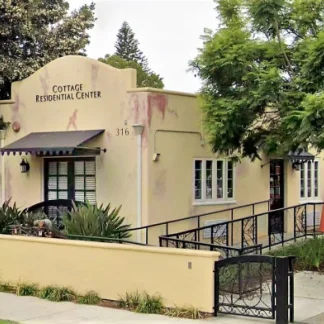Full Spectrum Recovery & Counseling
Full Spectrum Recovery & Counseling is an outpatient treatment dedicated to ...
Cottage Residential Center offers inpatient services for individuals struggling with alcohol and/or substance addiction. The program includes dual-diagnosis treatment, family support, compassionate care, individualized treatment and more. Cottage Residential Center is located at Santa Barbara, California.
Contact us for more information: (805) 569-7422

Connect with Cottage Residential Center by calling their admissions team directly.
(805) 569-7422 Website Get DirectionsThe Joint Commission, formerly known as JCAHO, is a nonprofit organization that accredits rehab organizations and programs. Founded in 1951, the Joint Commision's mission is to improve the quality of patient care and demonstrating the quality of patient care.
Joint Commission Accreditation: Yes
Research clearly demonstrates that recovery is far more successful and sustainable when loved ones like family members participate in rehab and substance abuse treatment. Genetic factors may be at play when it comes to drug and alcohol addiction, as well as mental health issues. Family dynamics often play a critical role in addiction triggers, and if properly educated, family members can be a strong source of support when it comes to rehabilitation. Cottage Residential Center's program treats the whole family, encouraging successful outcomes for both the chemically dependent and the family. Families are encouraged to participate fully in an intensive program that consists of education, multi-family group therapy, discharge planning and involvement in lifetime care activities.
Group therapy is any therapeutic work that happens in a group (not one-on-one). There are a number of different group therapy modalities, including support groups, experiential therapy, psycho-education, and more. Group therapy involves treatment as well as processing interaction between group members.
In individual therapy, a patient meets one-on-one with a trained psychologist or counselor. Therapy is a pivotal part of effective substance abuse treatment, as it often covers root causes of addiction, including challenges faced by the patient in their social, family, and work/school life.
Group therapy is any therapeutic work that happens in a group (not one-on-one). There are a number of different group therapy modalities, including support groups, experiential therapy, psycho-education, and more. Group therapy involves treatment as well as processing interaction between group members.
In individual therapy, a patient meets one-on-one with a trained psychologist or counselor. Therapy is a pivotal part of effective substance abuse treatment, as it often covers root causes of addiction, including challenges faced by the patient in their social, family, and work/school life.
In individual therapy, a patient meets one-on-one with a trained psychologist or counselor. Therapy is a pivotal part of effective substance abuse treatment, as it often covers root causes of addiction, including challenges faced by the patient in their social, family, and work/school life.
Full Spectrum Recovery & Counseling is an outpatient treatment dedicated to ...
Casa Serena - Castillo Street (also known as the Graduate House) is a private su...
AA – Alcoholics Anonymous – Central Office is a non-profit rehab located in Sant...
SOS Sober Living for Women is a private sober living facility in Santa Barbara, ...